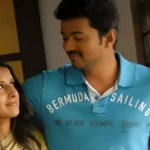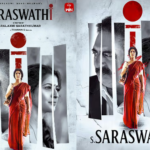Thangalaan Review – Pa Ranjith has yet again made a film with various layers that comment, question, educate and appeal to our conscience. With this film he breaks too many rules of film making and creates a language of his own,
writes Rajeshwari Kalyanam
Thangalaan opens with a meeting with British officers over search for gold in North Arcot set in the 19th century (1859 CE) and shifts to the morning scenes in a tribal hamlet of Veppur village that is hurrying to go to work. There is one lady Gangamma (Parvathy) calling out her son Asoka even while cribbing about the man of her house who is still in bed dreaming away. And, he (Chiyaan Vikram) is dreaming of another time – of war and fight for gold when he is harshly woken up by his wife, and together they set out to work in their field. He is the only man in his hamlet, who owns a small piece of land that belonged to his forefathers, where he works with his wife three daughters and son. He grows paddy. However the devious ways of the Jameen (landlord) force him to work in his own land as bonded labour along with his family.

In these first few minutes the director of the film Pa Ranjith quickly establishes the context and then goes on bring up the caste politics, the politics of clothes one gets to wear (a blouse is a luxury only affluent caste ladies could afford), class oppression, the fight for identity and respect and the various ways people of lower economic strata tried to achieve respect over the time, which included even aspiring for the grace of Shri Vishnu via religion (there are references to the initiation of the so called untouchables to Vaishnavism and Brahminism by Shri Ramanjucharya; and in Thangalaan’s case by trying to look for gold which he feels will change the way of living for his folks. He feels that by helping the British find gold he will earn his share, and can overcome Jameen’s oppression (after all Jameen works for the king and king works for the British), and he also hopes that this is the only way the clan can get back the land that rightfully belongs to them.
There is an abundance of tropes and metaphors that you take with you when you watch Pa Ranjith’s films. This one is no different. Politics of food via a buffalo hunting scene are the kind of scenes that stay poignantly with you.

Parallel to this central narrative are Thangalaan’s dreams of past which become his bed time stories – like the one in which his forefather would sieve the sand from Kaveri river to find gold, and how he fought the sorceress Aarthi who protects the Gold along with the Nagas (snakes) when king promises to return their lands. He even tells his children the story of how the sorceress was killed. This narration and Thangalaan’s visions add a fantasy layer to the film. These scenes also like everything else in the director’s films – refer to the man – nature conflict and the man who is supposed to protect his right turns to exploitation for his desire of a better life – and how nature has its way of giving and even getting back.

As far as film making is concerned – with so many elements the film does get complicated and vague in parts and this affects the power of narration – which is the backbone of any film. However brilliant performances of the cast, the camera work, dialogues take the story forward despite itself.

In this screenplay that has ample references to history of oppression and a few references to history of religion (the decline of Buddhism and the role of the kings and their Gurus) – and it is interesting how Pa Ranjith does not flinch from showing what he evidently read and researched. He however does not make any statements and direct references to any. He only showcases these issues via his characters and scenes and compels you to think. For example in the story of his forefathers that Thangalaan tells his children. The story remains the same for ages. The conflict continues and finds reflection in the present where what has changed is only who the powerful are and how they control others.
The film Thangalaan also refers to the rights of the people over the land that they work on, and the rights of the tribals over the natural produce of the forest, and most importantly the state of the oppressed who continue to be oppressed and discriminated despite their struggle for a different way of living. And, how and why there is still the constant struggle to overcome social oppression, and assert identity – and they remain aspirations for many and have driven many a revolution over the ages.
And one reflects – after all Thangalaan may be right. What education, religion or democracy failed to achieve perhaps money or in this case gold can make it happen – for the underprivileged classes to gain respect and equality in this society that continues to grapple with class and caste supremacy.
Or does it really???
Thangalaan Review – Pa Ranjith has yet again made a film with various layers that comment, question, educate and appeal to our conscience. With this film he breaks too many rules of film making a creates a language of his own. Havent several legendary directors in the past that we read about done the same?
Pa Ranjith proves himself as bold and risk taking director. He refers to topics and issues that for long have remained points of discussion and debate and dissent. And, hence its no wonder Thangalaan faces backlash and love in equal measure. You can hate, love, like or dislike – but you cannot ignore Pa Ranjith and his films – this one is no different.
What the film lost in terms of visuals (that elude the budgets spent) in places – it makes up for in performances. The film released in Tamil, Malayalam, Telugu and Kannada. The Telugu dubbing part is done well.
Cast: Chiyaan Vikram, Malavika Mohanan, Parvathy Thiruvothu, Pasupathi, Harikrishnan, Daniel Caltagirone, Preeti Karan
Director: Pa Ranjith
Dialogues: Tamil Prabha
Cinematography: Kishore Kumar
Music: GV Prakash Kumar
Producer: KE Gnanavel Raja
OTT: Netflix












